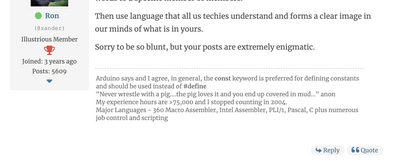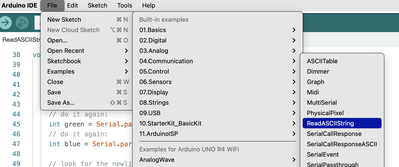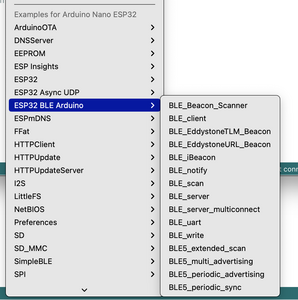@gamen <<<<<<<< SEE THAT That is how you respond to someone. It gets there by you clicking the REPLY button at the bottom right of every post but the first. That causes an email to be sent to the author and any other persons you add to the replay via the @name mechanism.
As to your question:
The following is what you said. I do not see ANDROID anywhere in the forum description or any of it's sub-forums. HOWEVER, if you know how Bluetooth and/or Bluetooth Low Energy works (I don't) then you want to look for a Sample in the 'ArduinoBLE' library that is close to what you want. Take that sample and modify it to do what you want. The closest example is what I posted in the 2nd pic below. NOTE always select the relevant board first as the samples change for each board.
problems connecting an Android to R4Wifi/ Bluetooth using the ArduinoBLE library,
I have no idea what MIT2 is.
IF you use ChatGPT or any other AI, please clearly mark what is AI code.
First computer 1959. Retired from my own computer company 2004.
Hardware - Expert in 1401, and 360, fairly knowledge in PC plus numerous MPU's and MCU's
Major Languages - Machine language, 360 Macro Assembler, Intel Assembler, PL/I and PL1, Pascal, Basic, C plus numerous job control and scripting languages.
Sure you can learn to be a programmer, it will take the same amount of time for me to learn to be a Doctor.
Hi @gamen,
Sorry, this is out of my present experience, so these suggestions may not be practical, but perhaps worth at least a few moments of pondering, to see if you they suggest a way forward.
If you are only suggesting that Bill @dronebot-workshop) considers making a specific video/blog, then that is specific question for Bill to answer, bearing in mind his costs in time, money, etc involved. If you are asking for help from the forum community, then this message considers those ramifications.
=========
The Arduino R4 (I think) is a fairly new board, and compared to say an ESP32, fairly expensive board. I don't mean that as a criticism of the supplier, but it suggests few, if any, of this forum members will have actually seen, and maybe willl ever see, one on the bench. So whilst we might like, and sometimes be able, to help, it may only by using our broader experience to answer specific questions, rather than providing a complete how-to, which obviously would require the provider to obtain the necessary hardware, and build the project.
The corollary of the previous pararaph, is that since the R4 apparently uses and ESP32 for its WiFi and Bluetooth capability, have you considered whether an ESP32 would be a simpler, and better known, starting point for you to get experience setting up the connections you desire. Sorry, I know Bluetooth comes in many 'flavours', and I am not clear if a standard ESP32 covers your interests, but I am hoping at least one of the ESP32 family, ideally the basic ESP32, but the others are also readily available at low cost, will meet your needs.
That does not mean your final project could not use the R4 board, if it provides some ancilliary capabilities that a 'simple' ESP32 lacks, but it might provide a pathway for you to make progress. Whilst I make no predictions of what you will find for your project, it is quite common to be able to 'transfer' an Arduino program from one processor board to another, doing little more than making a copy of the Arduino sketch, selecting the new board, and recompiling.
In addition to any articles authored by Bill (which will be of an excellent quality), a few second Google showed a pair of Bluetooth articles using the ESP32, and I suspect there are many more. Sorry, I am not vouching for their quality, or judging whether they are appropriate for what you intend to do, but maybe it would be worth your while checking.
https://www.electronicshub.org/esp32-bluetooth-tutorial/
https://www.electronicshub.org/esp32-ble-tutorial/
----------
I wish you good luck with your project. Best wishes, Dave
@davee Hi, thanks for your answer. I didn´t think it such a great achievement to make a video on this specific subject since there already is a detailed video fom Bill on the 2 R4 boards, where the Wifi connectivity is described in detail, along with a simple coded example. All i would want is the same thing for the Bluetooth connection. And then with the natural connection to a mobile phone, Android in this case.
However, I´ll go through your provided links to see if they do any good. At least they describe the why´s, not just giving you a code.
I just want to ridden myself of all the frustrations of failing constantly.
@gamen If you set the board to Arduino Nano ESP32 you will see in the board examples a bunch of BLE examples including a generic server and client. My hunch is this software will soon be released for the UNU R4 as well. If you don;t want to wait, get a Nano ESP.
First computer 1959. Retired from my own computer company 2004.
Hardware - Expert in 1401, and 360, fairly knowledge in PC plus numerous MPU's and MCU's
Major Languages - Machine language, 360 Macro Assembler, Intel Assembler, PL/I and PL1, Pascal, Basic, C plus numerous job control and scripting languages.
Sure you can learn to be a programmer, it will take the same amount of time for me to learn to be a Doctor.
Hi @gamen,
Sorry I couldn't give a concrete answer, but hopefully you can find a way through.
----------------
I have no connection with Bill, other than being a user of the resources he kindly provides, but the videos and blogs look extremely professional and well-researched. I can only widely guess at the amount of time and money that takes, but I feel sure that if he were to contract out the task to a commercial concern, then to get a matching quality, the resulting bills would be eye-watering. In other words, I think each of his video/blog pairs are a great achievement in their own right. Remember, unlike many of the 'influencers' on the web, before the hour or more required to make the video, there must be many hours of building circuits, code, etc., fixing problems, as well as all of the other preparation. If it is an easy thing to do, with well documented recipes elsewhere, I presume you would not be asking.
-----------------
Please note that whilst I hope the links are useful, I did not spend any time searching for the best ones. I suggest you start with those, but look further for yourself.
And as a general point, may I suggest a general approach to consider, which can apply to hardware, software and lots of other challenges as well. If you start on a project, but find you are hitting a brick wall, then step back, have a coffee or similar, and look for something that does a small part of what you want to achieve, or maybe even does a small part of something similar. Have a go at that, to see if you can make some progress. You may have to do this multiple times, so be too despondent if something proves to be even harder. But the chances are, you will gradually build up experience and expertise to put the whole thing together.
The problem is that when you start something completely new, there are lots of tiny mistakes and pitfalls to catch you out. If you only had one to deal with, you would be fine, but when you have 10 at the same time, even if you fix one, you might not realise it, as the other 9 are preventing you from movng forward.
Hence, try to start with systems that are better supported... I quickly suggested a simple ESP32 (dev board) on the basis it has been around for a few years, and can be purchased for a fraction of the cost of an R4, so even if it is only used as a temporary training tool, your outlay will be modest.
I am not saying it is the best approach ... that is for you to find ... but I hope it illustrates the bare bones of a way forward.
Best wishes with your project. Dave




